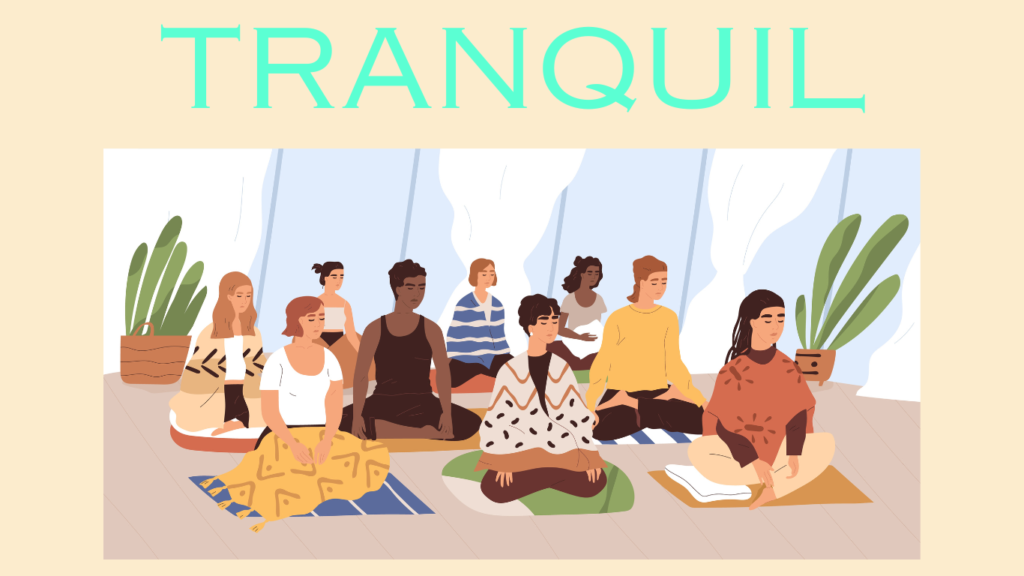The Transformative Power of a Meditation Retreat: A Journey Inward

In our fast-paced, constantly connected world, the idea of disconnecting for a few days might feel radical, even intimidating. However, stepping away from daily routines to immerse oneself in silence and self-reflection can be one of the most profoundly healing experiences. A meditation retreat offers just this—a dedicated time and space to look inward, refresh the mind, and come back to life with a new perspective. Here’s what a meditation retreat is all about, what to expect, and why it might just be the best investment in yourself.
Table of Contents
What is a Meditation Retreat?
A meditation retreat is typically a structured experience where participants step away from their usual environments and routines to focus solely on meditation and mindfulness. Retreats can vary widely, from silent retreats where participants speak little or not at all, to guided retreats that include group discussions, teachings, and workshops.
Whether it’s a weekend in a cabin or a week in a remote monastery, the goal is to foster inner peace, clarity, and awareness. The meditation hall serves as a communal space for structured meditation sessions, silent meditation, guided sessions, and dharma talks.
These retreats are offered in many forms—Buddhist meditation, Vipassana (insight meditation), Zen meditation, or more secular versions tailored for modern wellness. The common thread, however, is the opportunity to quiet the noise of the outside world and cultivate a deeper understanding of oneself.
A Buddhist monk often provides guidance and support during these retreats, offering personalized mentoring and sharing traditional practices to enhance the participants’ experience.
Types of Meditation Retreats
Meditation retreats come in various forms, catering to different needs and preferences. Here are some popular types of meditation retreats:
- Vipassana Meditation Retreats: These retreats focus on insight meditation, often practiced in noble silence. Participants develop mindfulness and awareness of the present moment, gaining deep insights into their thoughts and emotions.
- Insight Meditation Retreats: Emphasizing the development of wisdom and insight, these retreats incorporate Buddhist teachings to help participants understand the nature of mind and reality.
- Mindfulness Meditation Retreats: These retreats concentrate on cultivating mindfulness in everyday activities. Whether it’s eating, walking, or speaking, participants learn to bring full awareness to each moment.
- Yoga and Meditation Retreats: Combining yoga sessions with meditation practice, these retreats promote physical, mental, and emotional well-being. The integration of yoga helps prepare the body and mind for deeper meditation.
- Walking Meditation Retreats: Incorporating walking meditation, these retreats teach participants to cultivate mindfulness and awareness while moving. This practice can be particularly grounding and helps integrate mindfulness into daily life.
- Silent Meditation Retreats: Conducted in noble silence, these retreats allow participants to focus deeply on their meditation practice without the distractions of speech or digital devices. The silence fosters a profound sense of stillness and introspection.
What to Expect on a Vipassana Meditation Retreat
- Silence
Silence is one of the hallmarks of many meditation retreats. This “noble silence” can be challenging at first but is surprisingly transformative. By minimizing external interactions, participants can truly engage in self-reflection. You may be asked to refrain not only from talking but also from using digital devices and making eye contact to allow a deeper sense of stillness and focus. - Daily Schedule
Most retreats have structured schedules, often beginning early in the morning and running through evening meditation sessions. Activities include sitting and walking meditation, yoga, and sometimes journaling. This structure helps participants avoid distractions and gradually settle into a mindful routine. - Guidance and Teachings
While silent retreats are common, many offer some form of guidance from an experienced teacher or facilitator. These sessions help contextualize the practice, introduce mindfulness techniques, and offer valuable insights into the nature of mind and self-awareness. Some retreats also include group discussions where participants can ask questions and share experiences. - Physical and Mental Challenges
Retreats can be both physically and mentally challenging. Long hours of sitting, minimal amenities, and confronting your thoughts and emotions without the usual distractions can feel uncomfortable, even overwhelming. However, this is often where the real growth happens, as you learn to sit with discomfort and find peace in it. - Connection to Nature
Many retreats are set in scenic locations, from mountain monasteries to coastal sanctuaries. Being immersed in nature allows a deeper level of relaxation, and the natural beauty often enhances the experience of mindfulness and appreciation for the present moment.
Benefits of a Meditation Retreat
- Clarity and FocusFree from the distractions of daily life, retreat participants often experience heightened mental clarity. The consistent meditation practice helps to clear the mind and can lead to breakthroughs in understanding oneself and one’s purpose.
- Deep Relaxation and Stress ReductionOne of the most immediate benefits is the reduction in stress. A retreat environment is crafted to promote relaxation, and the techniques you learn can help regulate emotions, reduce anxiety, and promote a sense of calm that often lingers long after the retreat.
- Emotional Healing and Self-DiscoveryMeditation brings suppressed emotions and thoughts to the surface, allowing participants to process and understand them. Many people find healing in this process, as they face long-held fears, traumas, or anxieties and learn to let them go. Additionally, meditation practices help participants cultivate compassion for themselves and others, highlighting the emotional journey and personal growth achieved through these teachings.
- Enhanced MindfulnessBy the end of a retreat, many people experience a noticeable improvement in mindfulness. They become more attuned to the present moment and more aware of their habitual thought patterns, which leads to more conscious living.
- Sense of CommunityRetreats often attract like-minded people, and although they may not involve a lot of conversation, the shared experience can foster a deep sense of connection. Retreat participants often leave with friendships or a support network that reinforces their commitment to mindfulness.
How to Prepare for a Meditation Retreat with Noble Silence
- Practice Meditation at Home: Integrate meditation practices into your everyday life before attending a retreat. Familiarize yourself with basic meditation, especially if it’s a longer one. This will make the experience less overwhelming and allow you to settle into the practice more easily.
- Set Intentions, Not Expectations: Approach the retreat with an open mind, and avoid setting specific goals or outcomes. This openness will help you fully immerse in the experience and appreciate whatever unfolds.
- Pack Light and Practical: Comfortable clothing, a journal, a water bottle, and some warm layers are essential, especially if the retreat is in a natural setting.
- Prepare for Digital Detox: Commit to leaving work, social media, and even your phone behind. This digital disconnect allows you to immerse yourself fully in the experience.
Practical Considerations
When considering a meditation retreat, several practical factors come into play. Here are some key considerations:
Choosing a Retreat
- Location: Consider the location of the retreat center and its accessibility. Some retreats are held in remote, serene areas, while others may be closer to urban centers, offering different experiences and conveniences.
- Type of Meditation: Choose a retreat that focuses on the type of meditation you’re interested in, such as Vipassana, Insight, or Mindfulness. Each type offers unique benefits and practices.
- Level of Experience: Select a retreat that caters to your level of experience. Beginners might prefer shorter, guided retreats, while experienced practitioners may seek longer, more intensive programs.
- Duration: Decide on the length of the retreat, which can range from a few days to several weeks or even months. Consider your schedule and how much time you can commit to the practice.
- Cost: Consider the cost of the retreat, including any additional expenses such as transportation and accommodations. Some retreats offer scholarships or sliding scale fees to make them more accessible.
Popular Locations
Meditation retreats can be found in various locations around the world. Some popular destinations include:
- Asia: Countries such as Thailand, India, and Sri Lanka offer a rich cultural and spiritual heritage, making them ideal for meditation retreats. The Thai Forest Tradition, for example, provides a unique and immersive experience.
- Europe: Retreat centers in Europe, such as those in the UK, France, and Italy, offer a more Westernized approach to meditation and mindfulness. These centers often blend traditional practices with modern wellness techniques.
- North America: The United States and Canada have a thriving meditation retreat scene, with numerous centers offering a range of programs and styles. From the mountains to the coast, there are many serene locations to choose from.
- South America: Countries such as Brazil and Peru offer a unique blend of spiritual and cultural experiences, making them attractive destinations for meditation retreats. The natural beauty and rich traditions enhance the retreat experience.
- Australia and New Zealand: These countries offer a more laid-back and natural environment, perfect for meditation and mindfulness retreats. The stunning landscapes provide a tranquil backdrop for deepening your practice.
By considering these practical factors and exploring popular locations, you can find the perfect meditation retreat to suit your needs and preferences.
Is a Meditation Retreat at a Retreat Center Right for You?
A meditation retreat isn’t just for experienced meditators. Anyone with a desire to explore their mind, increase mindfulness, or find respite from the demands of daily life can benefit. For beginners, shorter retreats are recommended to ease into the practice, while those with more experience may want to try longer, more intense retreats.
Final Thoughts
A meditation retreat is a profound journey into self-discovery and mindfulness. It’s an experience that helps you slow down, reconnect, and learn tools for navigating life with greater ease and awareness. Although it may seem challenging at times, the rewards of a meditation retreat are often life-changing, bringing greater mental clarity, emotional balance, and a renewed sense of purpose. If you’re ready for a transformational journey inward, a meditation retreat might be calling your name.

